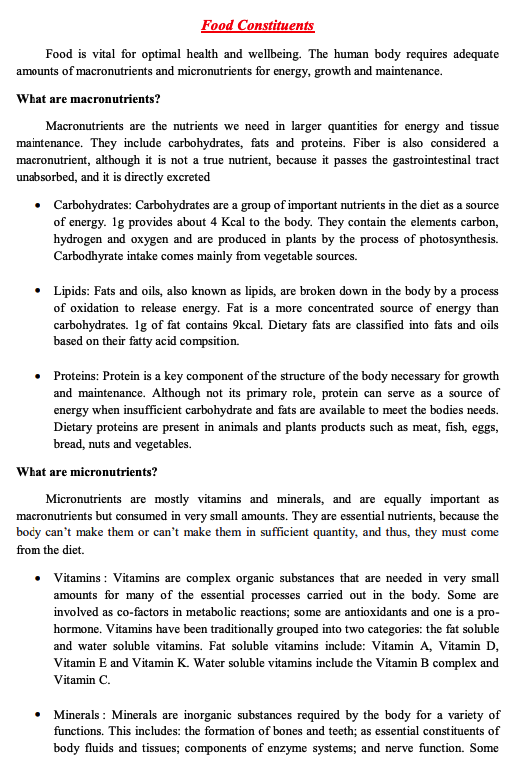Food Science Notes
Summary:
Food is essential for health, with macronutrients like carbohydrates (an energy-rich compound from plants), lipids (energy-packed fats and oils), and proteins (vital for growth and found in both plant and animal sources) needed in larger quantities. Conversely, micronutrients, which include vitamins (organic substances with categories like fat-soluble and water-soluble) and minerals (supporting functions from bone formation to nerve activity), are needed in smaller amounts but are equally vital. Protein, a primary building block in the body, has a dynamic role, with its requirements changing across life stages. It’s composed of amino acids, some of which the body can produce, while others must be consumed. The quality of protein sources is determined by their biological value, a measure of how well the body can utilize them, and combining different protein sources can enhance this value. However, deficiencies like Protein-energy malnutrition (PEM) can be severe, especially in developing nations. In the European Union, food information regulation (EU Regulation 1169/2011) ensures consumers are well-informed about food contents, including nutritional values and allergens. Lastly, Food Composition Tables (FCTs) further aid consumers by providing detailed breakdowns of the nutritional composition of various foods, evolving from basic tables in the past century to comprehensive sources today.
Excerpt:
Food Science Notes
Food Constituents
Food is vital for optimal health and well-being. The human body requires adequate macronutrients and micronutrients for energy, growth and maintenance.
What are macronutrients?
We need macronutrients in larger quantities for energy and tissue maintenance. They include carbohydrates, fats and proteins. Fibre is also considered a macronutrient, although it is not a true nutrient, because it passes the gastrointestinal tract unabsorbed, and is directly excreted.
- Carbohydrates: Carbohydrates are a group of important nutrients in the diet as a source of energy. 1g provides about 4 Kcal to the body. They contain the elements carbon, hydrogen and oxygen and are produced in plants by photosynthesis. Carbohydrate intake comes mainly from vegetable sources.
- Lipids: Fats and oils, also known as lipids, are broken down in the body by oxidation to release energy. Fat is a more concentrated source of energy than carbohydrates…


Reviews